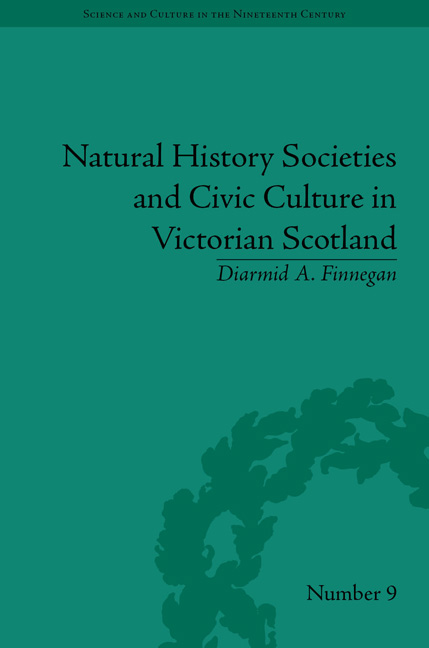Book contents
- Frontmatter
- CONTENTS
- Acknowledgements
- List of Figures and Tables
- Introduction
- 1 Founding Narratives
- 2 Fieldwork and Excursion Culture
- 3 Natural History and Civic Pride
- 4 Natural History and Self Culture
- 5 Organizing Subscriber Science
- 6 Scientific Motives and Civic Virtue
- Conclusion: Between Science and Civic Society
- Notes
- Works Cited
- Index
2 - Fieldwork and Excursion Culture
- Frontmatter
- CONTENTS
- Acknowledgements
- List of Figures and Tables
- Introduction
- 1 Founding Narratives
- 2 Fieldwork and Excursion Culture
- 3 Natural History and Civic Pride
- 4 Natural History and Self Culture
- 5 Organizing Subscriber Science
- 6 Scientific Motives and Civic Virtue
- Conclusion: Between Science and Civic Society
- Notes
- Works Cited
- Index
Summary
In 1865 John Gray, a founding member of the Natural History Society of Glasgow, published a sketch of the celebrated eighteenth-century Scottish naturalist, the Revd David Ure. In his potted biography Gray cast Ure as a heroic explorer fully equipped for the scientific investigation of local natural history. Ure, Gray noted, entered the field with,
a tin box for stowing curious plants – a large cudgel, armed with steel, so as to serve both as a spade and pick-axe; a few small chisels and other tools; a blow-pipe, with its appurtenances; a small liquid chemical apparatus, optical instruments, etc., etc., so that his friends used to call him a walking shop, or laboratory. In this way, he braved all weathers; and heat or cold, wet or dry, seemed equally indifferent to him.
In Gray's telling Ure's life provided a ‘romance of improvement’ in which fieldwork played an important part. Ure overcame not just the elements but also, in his single-minded pursuit of scientific truth, ignorance of nature and nature's God. In this way Gray's account reflected a widely shared set of assumptions about fieldwork which, as a moral as well as a scientific pursuit, aided the development of a sound mind and a healthy body.
As the example of Ure demonstrates, excursions with the purpose of exploring local natural history had a longer history and the outdoor work of nineteenth-century natural history societies participated in a rich and venerable tradition of fieldwork. David Allen, by identifying the earliest mentions of specialist equipment, outlets for publication and institutional supports, has uncovered fieldwork's rich and diverse past. In the eighteenth-century, fieldwork as a social rather than solitary pursuit received impetus from the ‘herbarizing’ associated with the Society of Apothecaries and from the need to supply a growing number of botanic gardens. Field excursions were employed from the late eighteenth and early nineteenth centuries to teach natural history at the University of Edinburgh and, later, at other British universities.
- Type
- Chapter
- Information
- Publisher: Pickering & ChattoFirst published in: 2014



